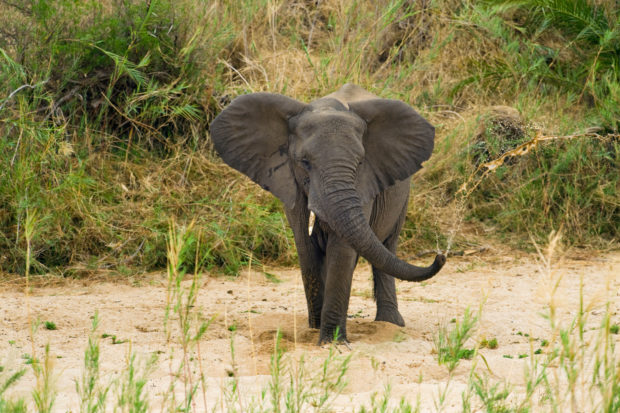France has become the first European country to ban the domestic trade in ivory and rhino horn. This lifesaving policy, announced by Environment Minister Ségolène Royal, goes far beyond the European Union’s current wildlife trade regulations and follows a series of progressive steps that Royal has already taken to combat wildlife trafficking since 2014. Royal also restricted the import of lion trophies into the country, so we are witnessing real leadership from her and from the administration of President François Hollande.

Elephants are among the most highly intelligent, empathetic creatures on the planet and they are under siege from poachers and trophy hunters. Photo by Alamy
During my hour-long appearance on “Super Soul Sunday” to discuss The Humane Economy, Oprah Winfrey included a short piece about the emotional lives of elephants and how they grieve for the loss of their family members, touching the bones of the fallen for days on end and helping to bury them. When we talk about policies to protect elephants, it’s not an abstraction. These are among the most highly intelligent, empathetic creatures on the planet – a keystone species in their ecosystems – and they are under siege from poachers and trophy hunters.
The United States implemented a near-total ban on the African elephant ivory trade earlier this year. In addition to this action by our federal government, a number of states have adopted or are considering measures to shut down in-state markets for such wildlife products. In Oregon, we are leading the Save Endangered Animals Oregon Coalition to support the measure, YES on 100, which will appear on the November ballot to protect 12 magnificent animals imperiled by poaching and global trade in their parts.
France’s move reinforces our continued call for an EU continent-wide ban. The European Union is a significant transit point and consumption destination for elephant ivory. It is the world’s largest exporter of pre-convention ivory – ivory acquired before the entry into force of the United Nations Convention on International Trade in Endangered Species of Wild Fauna and Flora (CITES). Between 2003 and 2014, 92 percent of EU exports of pre-convention ivory tusks went to China or Hong Kong. Between 2011 and 2014, EU member states reported seizures of around 4,500 ivory items and an additional 780 kg as reported by weight. The rest of the EU member states should not continue to be outliers, defying conservation pleas when countries such as China and a majority of African elephant range states support or are working toward closing their domestic ivory markets. The EU member states too need to step up to meet the threat and pass the right kinds of restrictions — ones that result in better protections for endangered species.
France’s actions come just a few weeks before a Humane Society International policy team heads to Johannesburg, South Africa, for the Conference of the Parties for CITES. This is the forum at which nearly every country in the world comes together to decide how much protection from trade will be offered to endangered and threatened species, including elephants, lions, and rhinos. The African Elephant Coalition (AEC), representing 70 percent of the African elephant range states, has put forward a proposal to list all African elephant populations under Appendix I, affording these animals the highest level of international protection under the CITES treaty. Other proposed agenda items by the AEC include calling for the closure of domestic ivory markets worldwide and restricting the trade in live elephants to release back into the wild in another country.
Shockingly, the European Commission has voiced opposition to these elephant protection proposals. The EU’s opposition has been called a “death sentence to the elephants” because as the largest voting block at the CITES Conference of the Parties, the EU holds the key to the success or failure of these crucial elephant protection documents. As if that is not shocking enough, World Wildlife Fund, the conservation organization, holds the same view and has encouraged the EU to oppose the AEC proposals.
Elephants and rhinos are beloved species and should not be reduced to trinkets, decorative items, or health tonic. The ecotourism revenue driven by wildlife watching provides an important economic foundation for so many local communities across the African continent.
Hats off to the French, to the range state nations, and to other countries that have taken strong measures to end the wasteful, disrespectful, and violent trade in wildlife products. We’re doing our part in the United States, with measures like YES on 100, and we’ll do still more in the next several years.
The post Merci to France for saying ‘non!’ to wildlife traffickers appeared first on A Humane Nation.
Enviroshop is maintained by dedicated NetSys Interactive Inc. owners & employees who generously contribute their time to maintenance & editing, web design, custom programming, & website hosting for Enviroshop.
